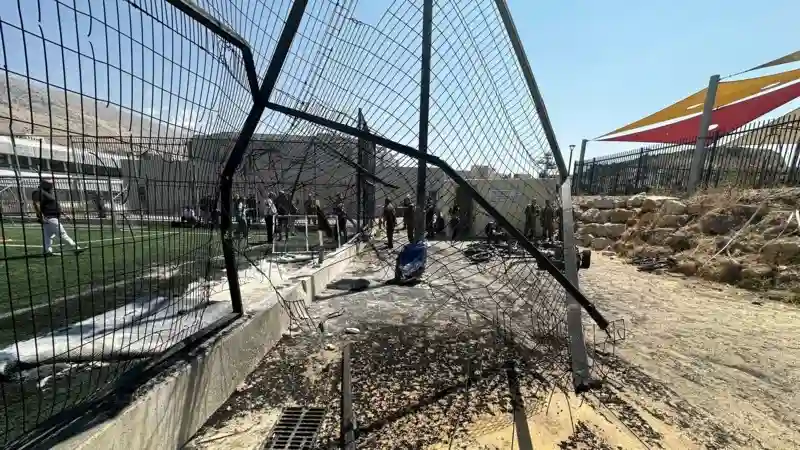Israeli warplanes carried out attacks against Hezbollah in Lebanon on Saturday night after 12 children and young adults were killed in a rocket strike while playing football in the Israeli-occupied Golan Heights.
Israel blamed the Iran-backed militant group for Saturday’s strike on the Druze town of Majdal Shams, but Hezbollah denied any involvement.
The Israel Defense Forces (IDF) said in a statement on Sunday:
Overnight, the IAF struck a series of Hezbollah terror targets both deep inside Lebanese territory and in southern Lebanon, including weapons caches and terrorist infrastructure in the areas of Chabriha, Borj El Chmali, and Beqaa, Kfarkela, Rab El Thalathine, Khiam, and Tayr Harfa.
Israeli forces and Hezbollah have regularly exchanged fire since 7 October when Hamas attacked Israel, triggering Israel’s military offensive on Gaza.
The rocket strike and the IAF’s retaliation have the potential to trigger an all-out war between Israel and Hezbollah.
Israel’s prime minister, Benjamin Netanyahu, had earlier vowed the Lebanese militant group would “pay a hefty price” after the deadly strike.
Israel’s Magen David Adom emergency services said “large numbers” of ambulances were dispatched to the scene to treat the casualties.
Israel’s foreign ministry released the identities of 10 children killed in Saturday’s strike, saying they were aged between 10 and 16.
An 11th person was named but no age was given. Details of the 12th casualty were not confirmed.
Video verified by BBC shows crowds of people on a football pitch and stretchers being rushed to ambulances.
Majdal Shams is one of four towns in the Golan Heights, where about 25,000 members of the Arabic-speaking Druze religious and ethnic group live.
The town is in the mountainous Golan Heights, close to the border with Syria. Israel has occupied the area since 1967, annexing it in 1981.
According to BBC, Saturday’s bloodshed at the town’s football pitch was the deadliest loss of life in and around Israel’s northern border since October.
Hezbollah spokesman Mohamad Afif denied responsibility for Saturday’s strike in the Golan Heights.
But IDF spokesman Daniel Hagari, who visited the scene of the air strike, accused Hezbollah of “lying and denying responsibility for the incident”.
Hagari claimed that the rocket was an Iranian-made Falaq-1 “owned exclusively by Hezbollah”.
Iran warned Israel that any new military “adventures” in Lebanon could lead to “unforeseen consequences”.
The air strike prompted Netanyahu, who was visiting the United States, to return home early.
US Secretary of State Antony Blinken told reporters on Sunday that “Every indication is that indeed the rocket was from Hezbollah.”
Blinken added that the US stands by “Israel’s right to defend” itself, but does not want to see the conflict spreading.
Lebanon’s government also stated in response to the strike, saying it “condemns all acts of violence and aggression against all civilians and calls for an immediate cessation of hostilities on all fronts”.
The Lebanese Foreign Minister Abdallah Bouhabib told the BBC that he did not think Hezbollah carried out the attack.
But he added, “it could be a mistake by the Israelis or by Hezbollah – I don’t know”.
In a statement, the United Nations said “maximum restraint” was crucial from all parties as the risk of a wider conflict would “engulf the entire region in a catastrophe beyond belief”.
More: Pindula News

